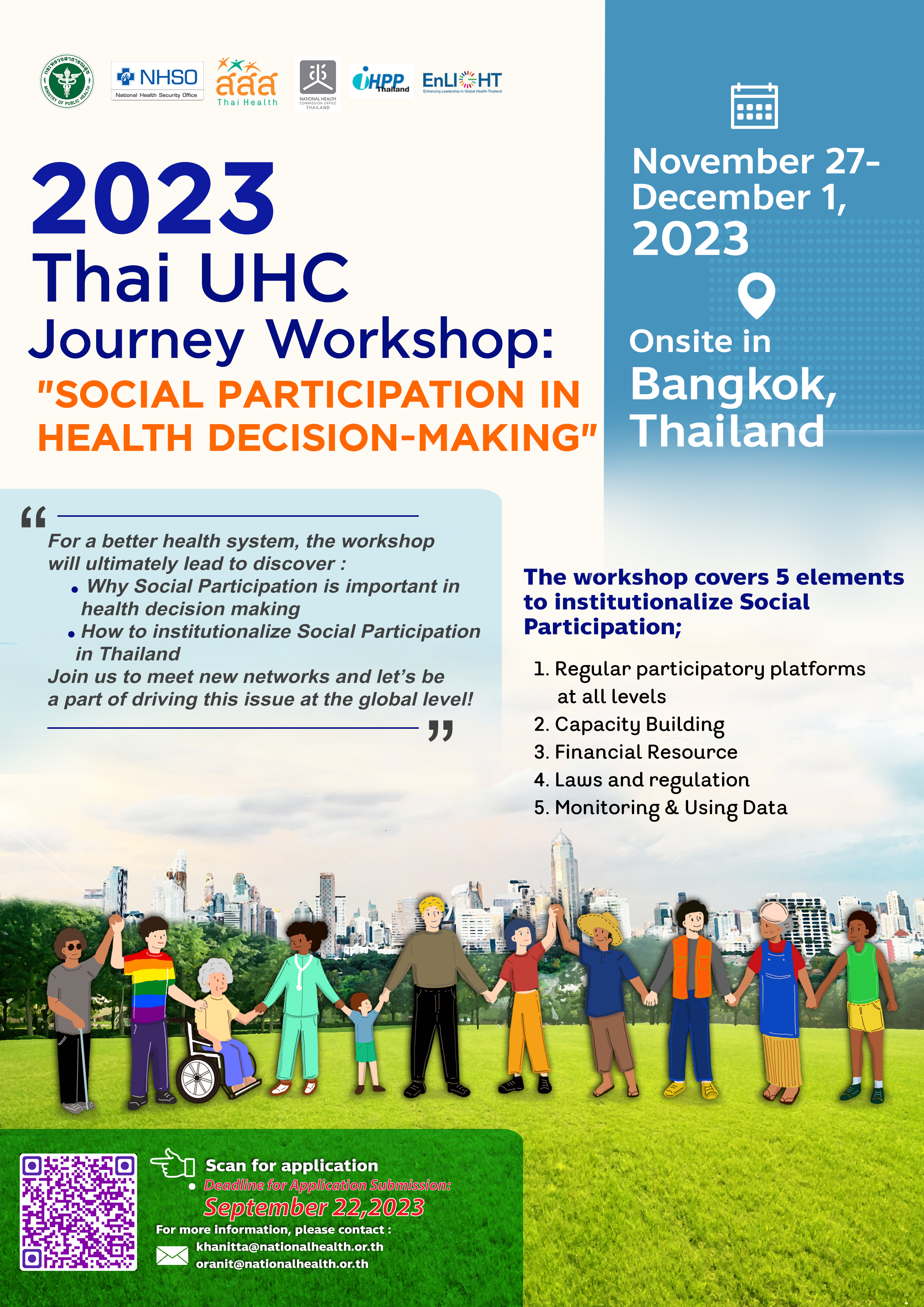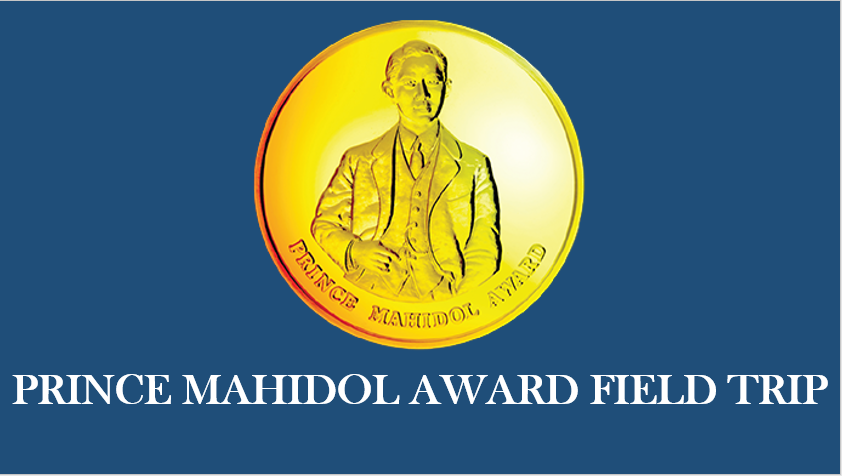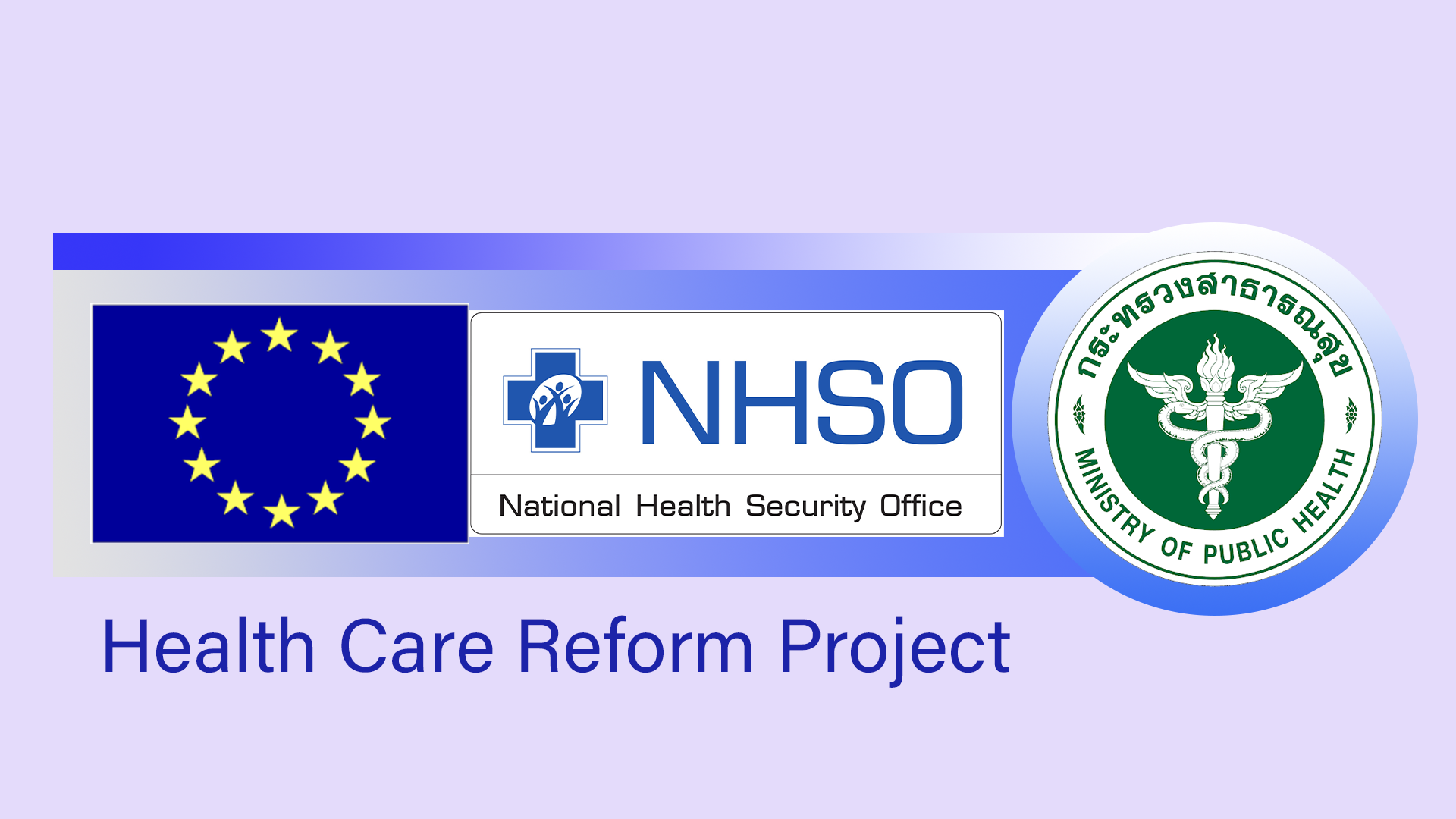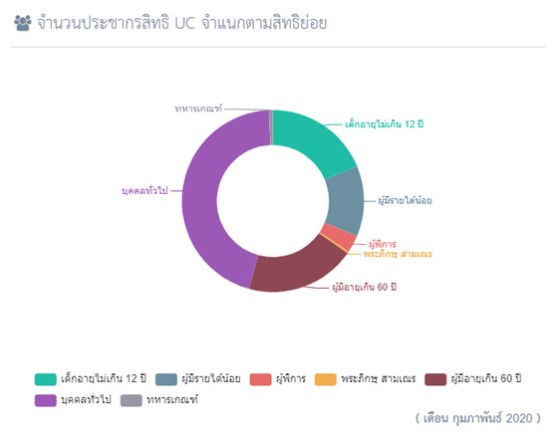Prince Mahidol Award Conference 2022 (PMAC2022) Virtual Field Trip
Prince Mahidol Award Conference 2022 (PMAC2022) Virtual Field Trip
“The World We Want: Actions Towards a Sustainable,
Fairer and Healthier Society”
“The World We Want: Actions Towards a Sustainable,
Fairer and Healthier Society”
Prince Mahidol Award Conference field trip was one of the highlight activities at Prince Mahidol Award conference (PMAC) since 2010. National Health Security Office is the key agency for organizing the PMAC field trip
.jpg)
Prince Mahidol Award conference has been organized as an annual international conference focusing on policy-related public health issues of global significance. that brings together leading policy makers, researchers, and members of civil society from around the world. The meeting also celebrates the Thai government's presentation of the Prince Mahidol Award, which was established in 1992 to commemorate the 100th birthday anniversary of Prince Mahidol of Songkla, who is considered “The Father of Modern Medicine and Public Health of Thailand.”
The Prince Mahidol Award Conference was first organized in 1998 to celebrate the 5th anniversary of the Prince Mahidol Award, then again in 2002 to celebrate the 10th anniversary of the award. To celebrate the 15th anniversary of the award and the 115th Birthday Anniversary of His Royal Highness Prince Mahidol of Songkla, Her Royal Highness Princess Maha Chakri Sirindhorn, President of the Prince Mahidol Award Foundation under the Royal Patronage, requested the conference to be organized annually since 2007.
The general objective of the annual Prince Mahidol Award Conference is to bring together leading public health leaders and stakeholders from around the world to discuss high priority global health issues, summarize findings, and propose concrete solutions and recommendations. It aims at being an international forum that global health institutes, both public and private, can co-own and use for the advocacy and the seeking of international advice on important global health issues. Specific objectives of each year’s conference will be discussed among key stakeholders and co-hosts of the conference.
The conference participants include ministers, senior government officials, intergovernmental organizations, international development partners, global health initiatives, health policy, and health systems researchers and advocators, civil society organizations, and high-level stakeholders from developing and developed countries.
.jpg)
Prince Mahidol Award Conference field trip has the objective to share experiences of Thailand on governance by a network that leads to inspiration and further discussion among international participants at PMAC. The summary of the case studies will be made in the English language in forms of booklet and VDO and presented to the international participants on the way to the case studies.
.jpg)
The Prince Mahidol Award Conference 2022 (PMAC 2022) was initial plan for Hybrid meeting, before being switched to fully virtual. It also changed to organize virtual field trips under the topic of “The World We Want: Actions Towards a Sustainable, Fairer and Healthier Society” in Phuket province, which known as “the Pearl of the Andaman”. Before the crisis, Phuket used to be a dream destination of both Thai and oversea tourists for its spectacular scenery, world recognized magnificent beaches, eco adventure and typical culture. It is considered an important tourism city of Thailand. Tourism accounts for 90% of the income within the province, with over 14 million tourists from overseas each year and an estimated annual income of over 470,000 million THB (16,000 million USD) mainly derived from tourism.
Phuket was selected as one of the PMAC field trip sites last year as it is the greatest economic zone that was suddenly affected by COVID-19 in March 2020. The outbreak has affected not only people’s related health issues but also the economic tragedy when the income relies on tourism.
.jpg)
After welcome to virtual PMAC2022 field trip by Dr. Jadej Thammatacharee, Secretary General of National Health Security office, The field trip was show how the experience of the COVID-19 pandemic is impacting the geopolitics of health, implications of key shifts in the makeup of the local population, the opportunity gains and threats of exponential technological change, and evolving threats to global health and wellbeing posed by climate change. The synopses of 2 site visits proposed for virtual PMAC 2022 are as follows:
1.Phuket Sandbox: Integrative, Seamless and Participation Management towards Sustainable Health and Wellness Tourism at Tourism Area
Thailand was the first country outside China to detect the first case of COVID-19 in the country on 13 January 2020. However, after the first detected case was reported in Thailand, the relevant stakeholders managed to keep the pandemic under control. Collaboration and seamless integration of all involved sectors and strong leadership in all levels were important and effective for COVID-19 management because the novel outbreak causes high impact to people in the whole country. Quick detection, medication and personal protection are the three essential keys in controlling the outbreak. Our implementation stem from a combination of public health measures, social measures and Universal Health Coverage or UHC.
(1).jpg)
Thailand’s policy on Universal Health Coverage (UHC) has made progress since its inception in 2002. Every Thai citizen is now entitled to essential health services at all life stages. UHC is the key in providing a timely response to health emergencies. Dealing with the COVID-19 pandemic, like many other countries, Thailand has introduced strategic measures for controlling the contagious situation as quickly as possible for the benefit of the people. Everyone in Thailand will be able to access the COVID-19 related health services both for Thais and foreigners. The services include free active screening and surveillance, testing, tracing, quarantine, treatment in hospital, hospitel, home isolation and community isolation. The UHC made a more significant success stems from a combination of public health and social measures, including effective communication strategies, enhanced social safety nets, and awareness-raising campaigns based on these three principles of equity, efficiency, and participation.
.jpg)
Dealing with the COVID-19 pandemic in Phuket was extremely challenging as there were a large number of tourists from all over the world during the peak time of infection. Nevertheless, with integrative, seamless and participation of public organizations, the private sector, and communities, along with the experiences in dealing with the past emerging infectious diseases
such as SARS and MERS, Phuket was able to control the outbreak of COVID-19 within a couple of months. The strategies that lead to this success include a super lockdown measure, lockdown at a district level and village level in some areas, collaboration of all sectors for screening, local quarantine supported by the hotel industry, and establishment of a field hospital which had the highest number of beds in the country for COVID-19 patients. However, there were many damages. The hotel and tourism industry, the main business of Phuket, had to close down and laid off their staff. This has had impact on the household income chain.
It was a big challenge to revitalize and recover Phuket’s economy. With the synergy of all sectors, Phuket has been able to efficiently manage for controlling the outbreak as well as high coverage of COVID-19 vaccination. Tourism was reopened since 1 July 2021 under the “Phuket Sandbox program” that allows vaccinated foreign tourists with a special tourist visa (STV) to enter Phuket and do not need to quarantine, but they must stay with freely travelling in Phuket and make all tourists believe that Phuket is a safe haven.

The field trip covered the issue of this program management which needs integrative, seamless and participation management and what is a “new normal” were agile and adaptable towards sustainable medical and wellness tourism.
2.Regeneration of the EnvironmentImpactof COVID19 and Human Behaviorsin aTourist Area
Phuket is a world tourist destination because of its renowned nature. However, "every coin has two sides".The more tourists come, the more natural resources are consumed. Environmental conservation has been a challenge for Phuket.Many efforts and approaches have been made to balance the environment and tourists for a long period. When COVID-19 rapidly spread across the globe and was declared a pandemic by the World Health Organization on January 30, 2020, it has generated unprecedented impacts on the whole world, including Thailand.The outbreak has led to a global catastrophic situation resulting in a high number of deaths and infections. It has also caused significant socioeconomic losses, especially in Phuket due to national and international travel restrictions. COVID-19 prevention and control measures increase the amount of infectious waste and sewage.This requires proper waste management.
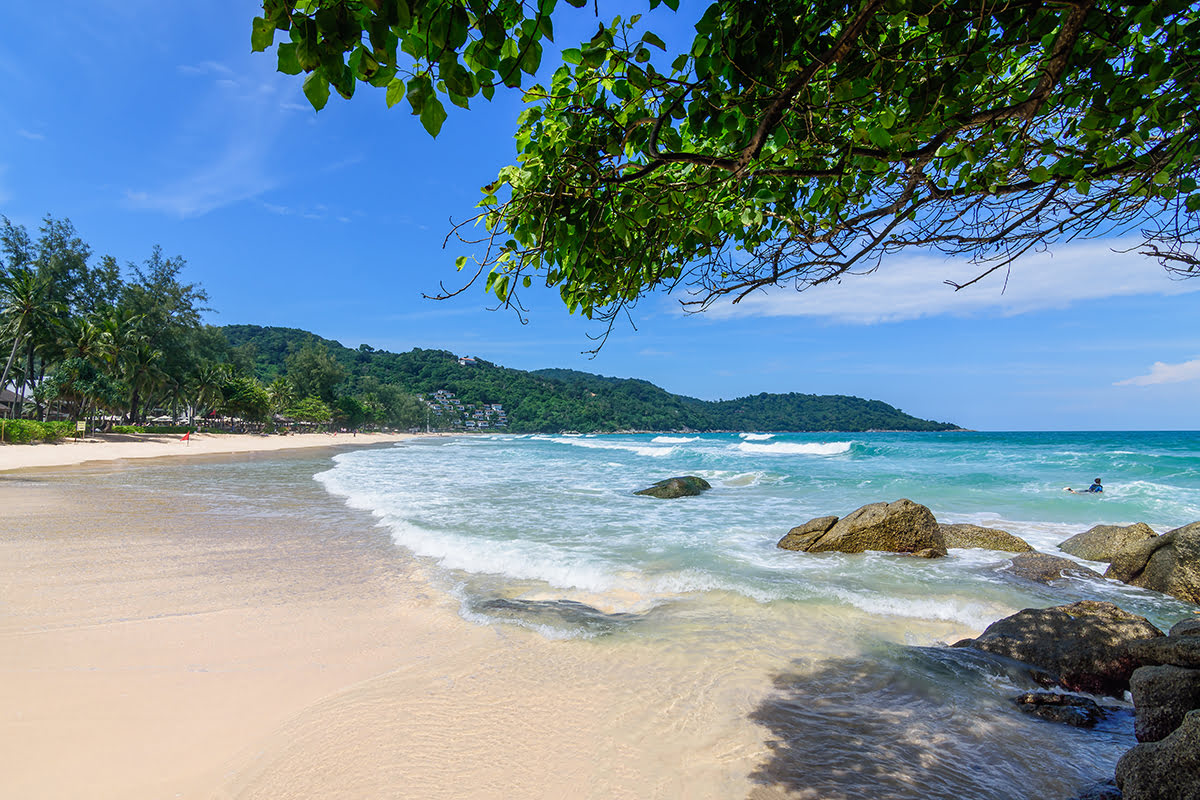
The impacts of the crisis have also shown a positive side. When the country was lockdown, the restriction was applied to the entire country, the number of passengers visiting Phuket declined dramatically. Tourism business and sightseeing had to shut down and caused many effects on people, but it has imparted many positive changes on the environment because the nature has time to rest and recover. The water quality of the sea has improved. Endangered marine animals such as dolphins, omura's whale, and whale shark have been sighted and reported in the Andaman Sea.
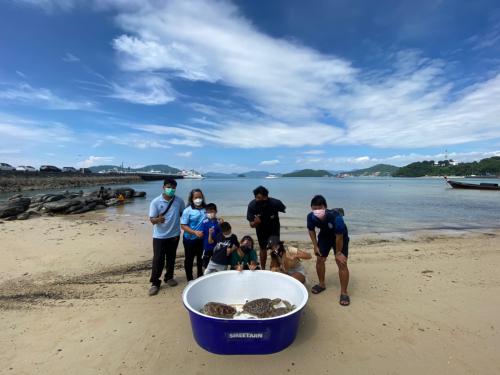
This field trip was highlight two places: the Phuket Marine Biological Center and Ban Laem Tukkae, a community of an indigenous marine community called “Chao Lay or Urak Lawoi”. Examples of strategies for conserving and restoring the environment and nature to balance the marine and coastal ecological system, health of people, and economic and tourism of Phuket will be presented. The future plan and actions will also be discussed.
.jpg)
Field Trip VDO >>> https://youtu.be/bjGVWqDwheQ
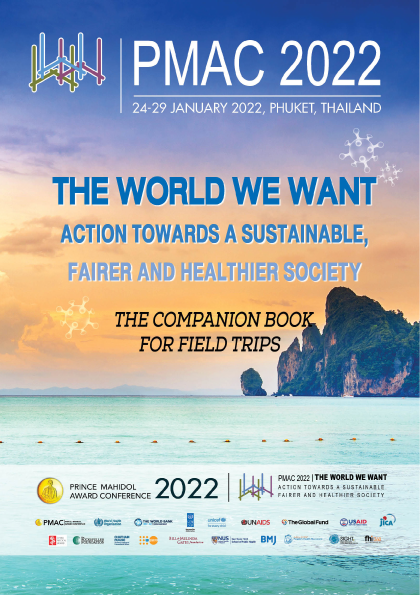
Read The PMAC 2020 Field Trip Companion Book >>> https://pmac2022.com/fieldtrip
IN DEPTH
Prince Mahidol Award Conference 2022 (PMAC2022) Virtual Field Trip
Prince Mahidol Award Conference 2022 (PMAC2022) Virtual Field Trip
“The World We Want: Actions Towards a Sustainable,
Fairer and Healthier Society”
“The World We Want: Actions Towards a Sustainable,
Fairer and Healthier Society”
Prince Mahidol Award Conference field trip was one of the highlight activities at Prince Mahidol Award conference (PMAC) since 2010. National Health Security Office is the key agency for organizing the PMAC field trip
.jpg)
Prince Mahidol Award conference has been organized as an annual international conference focusing on policy-related public health issues of global significance. that brings together leading policy makers, researchers, and members of civil society from around the world. The meeting also celebrates the Thai government's presentation of the Prince Mahidol Award, which was established in 1992 to commemorate the 100th birthday anniversary of Prince Mahidol of Songkla, who is considered “The Father of Modern Medicine and Public Health of Thailand.”
The Prince Mahidol Award Conference was first organized in 1998 to celebrate the 5th anniversary of the Prince Mahidol Award, then again in 2002 to celebrate the 10th anniversary of the award. To celebrate the 15th anniversary of the award and the 115th Birthday Anniversary of His Royal Highness Prince Mahidol of Songkla, Her Royal Highness Princess Maha Chakri Sirindhorn, President of the Prince Mahidol Award Foundation under the Royal Patronage, requested the conference to be organized annually since 2007.
The general objective of the annual Prince Mahidol Award Conference is to bring together leading public health leaders and stakeholders from around the world to discuss high priority global health issues, summarize findings, and propose concrete solutions and recommendations. It aims at being an international forum that global health institutes, both public and private, can co-own and use for the advocacy and the seeking of international advice on important global health issues. Specific objectives of each year’s conference will be discussed among key stakeholders and co-hosts of the conference.
The conference participants include ministers, senior government officials, intergovernmental organizations, international development partners, global health initiatives, health policy, and health systems researchers and advocators, civil society organizations, and high-level stakeholders from developing and developed countries.
.jpg)
Prince Mahidol Award Conference field trip has the objective to share experiences of Thailand on governance by a network that leads to inspiration and further discussion among international participants at PMAC. The summary of the case studies will be made in the English language in forms of booklet and VDO and presented to the international participants on the way to the case studies.
.jpg)
The Prince Mahidol Award Conference 2022 (PMAC 2022) was initial plan for Hybrid meeting, before being switched to fully virtual. It also changed to organize virtual field trips under the topic of “The World We Want: Actions Towards a Sustainable, Fairer and Healthier Society” in Phuket province, which known as “the Pearl of the Andaman”. Before the crisis, Phuket used to be a dream destination of both Thai and oversea tourists for its spectacular scenery, world recognized magnificent beaches, eco adventure and typical culture. It is considered an important tourism city of Thailand. Tourism accounts for 90% of the income within the province, with over 14 million tourists from overseas each year and an estimated annual income of over 470,000 million THB (16,000 million USD) mainly derived from tourism.
Phuket was selected as one of the PMAC field trip sites last year as it is the greatest economic zone that was suddenly affected by COVID-19 in March 2020. The outbreak has affected not only people’s related health issues but also the economic tragedy when the income relies on tourism.
.jpg)
After welcome to virtual PMAC2022 field trip by Dr. Jadej Thammatacharee, Secretary General of National Health Security office, The field trip was show how the experience of the COVID-19 pandemic is impacting the geopolitics of health, implications of key shifts in the makeup of the local population, the opportunity gains and threats of exponential technological change, and evolving threats to global health and wellbeing posed by climate change. The synopses of 2 site visits proposed for virtual PMAC 2022 are as follows:
1.Phuket Sandbox: Integrative, Seamless and Participation Management towards Sustainable Health and Wellness Tourism at Tourism Area
Thailand was the first country outside China to detect the first case of COVID-19 in the country on 13 January 2020. However, after the first detected case was reported in Thailand, the relevant stakeholders managed to keep the pandemic under control. Collaboration and seamless integration of all involved sectors and strong leadership in all levels were important and effective for COVID-19 management because the novel outbreak causes high impact to people in the whole country. Quick detection, medication and personal protection are the three essential keys in controlling the outbreak. Our implementation stem from a combination of public health measures, social measures and Universal Health Coverage or UHC.
(1).jpg)
Thailand’s policy on Universal Health Coverage (UHC) has made progress since its inception in 2002. Every Thai citizen is now entitled to essential health services at all life stages. UHC is the key in providing a timely response to health emergencies. Dealing with the COVID-19 pandemic, like many other countries, Thailand has introduced strategic measures for controlling the contagious situation as quickly as possible for the benefit of the people. Everyone in Thailand will be able to access the COVID-19 related health services both for Thais and foreigners. The services include free active screening and surveillance, testing, tracing, quarantine, treatment in hospital, hospitel, home isolation and community isolation. The UHC made a more significant success stems from a combination of public health and social measures, including effective communication strategies, enhanced social safety nets, and awareness-raising campaigns based on these three principles of equity, efficiency, and participation.
.jpg)
Dealing with the COVID-19 pandemic in Phuket was extremely challenging as there were a large number of tourists from all over the world during the peak time of infection. Nevertheless, with integrative, seamless and participation of public organizations, the private sector, and communities, along with the experiences in dealing with the past emerging infectious diseases
such as SARS and MERS, Phuket was able to control the outbreak of COVID-19 within a couple of months. The strategies that lead to this success include a super lockdown measure, lockdown at a district level and village level in some areas, collaboration of all sectors for screening, local quarantine supported by the hotel industry, and establishment of a field hospital which had the highest number of beds in the country for COVID-19 patients. However, there were many damages. The hotel and tourism industry, the main business of Phuket, had to close down and laid off their staff. This has had impact on the household income chain.
It was a big challenge to revitalize and recover Phuket’s economy. With the synergy of all sectors, Phuket has been able to efficiently manage for controlling the outbreak as well as high coverage of COVID-19 vaccination. Tourism was reopened since 1 July 2021 under the “Phuket Sandbox program” that allows vaccinated foreign tourists with a special tourist visa (STV) to enter Phuket and do not need to quarantine, but they must stay with freely travelling in Phuket and make all tourists believe that Phuket is a safe haven.

The field trip covered the issue of this program management which needs integrative, seamless and participation management and what is a “new normal” were agile and adaptable towards sustainable medical and wellness tourism.
2.Regeneration of the EnvironmentImpactof COVID19 and Human Behaviorsin aTourist Area
Phuket is a world tourist destination because of its renowned nature. However, "every coin has two sides".The more tourists come, the more natural resources are consumed. Environmental conservation has been a challenge for Phuket.Many efforts and approaches have been made to balance the environment and tourists for a long period. When COVID-19 rapidly spread across the globe and was declared a pandemic by the World Health Organization on January 30, 2020, it has generated unprecedented impacts on the whole world, including Thailand.The outbreak has led to a global catastrophic situation resulting in a high number of deaths and infections. It has also caused significant socioeconomic losses, especially in Phuket due to national and international travel restrictions. COVID-19 prevention and control measures increase the amount of infectious waste and sewage.This requires proper waste management.

The impacts of the crisis have also shown a positive side. When the country was lockdown, the restriction was applied to the entire country, the number of passengers visiting Phuket declined dramatically. Tourism business and sightseeing had to shut down and caused many effects on people, but it has imparted many positive changes on the environment because the nature has time to rest and recover. The water quality of the sea has improved. Endangered marine animals such as dolphins, omura's whale, and whale shark have been sighted and reported in the Andaman Sea.

This field trip was highlight two places: the Phuket Marine Biological Center and Ban Laem Tukkae, a community of an indigenous marine community called “Chao Lay or Urak Lawoi”. Examples of strategies for conserving and restoring the environment and nature to balance the marine and coastal ecological system, health of people, and economic and tourism of Phuket will be presented. The future plan and actions will also be discussed.
.jpg)
Field Trip VDO >>> https://youtu.be/bjGVWqDwheQ

Read The PMAC 2020 Field Trip Companion Book >>> https://pmac2022.com/fieldtrip
Events
Prince Mahidol Award Conference 2022 (PMAC2022) Virtual Field Trip
Prince Mahidol Award Conference 2022 (PMAC2022) Virtual Field Trip
“The World We Want: Actions Towards a Sustainable,
Fairer and Healthier Society”
“The World We Want: Actions Towards a Sustainable,
Fairer and Healthier Society”
Prince Mahidol Award Conference field trip was one of the highlight activities at Prince Mahidol Award conference (PMAC) since 2010. National Health Security Office is the key agency for organizing the PMAC field trip
.jpg)
Prince Mahidol Award conference has been organized as an annual international conference focusing on policy-related public health issues of global significance. that brings together leading policy makers, researchers, and members of civil society from around the world. The meeting also celebrates the Thai government's presentation of the Prince Mahidol Award, which was established in 1992 to commemorate the 100th birthday anniversary of Prince Mahidol of Songkla, who is considered “The Father of Modern Medicine and Public Health of Thailand.”
The Prince Mahidol Award Conference was first organized in 1998 to celebrate the 5th anniversary of the Prince Mahidol Award, then again in 2002 to celebrate the 10th anniversary of the award. To celebrate the 15th anniversary of the award and the 115th Birthday Anniversary of His Royal Highness Prince Mahidol of Songkla, Her Royal Highness Princess Maha Chakri Sirindhorn, President of the Prince Mahidol Award Foundation under the Royal Patronage, requested the conference to be organized annually since 2007.
The general objective of the annual Prince Mahidol Award Conference is to bring together leading public health leaders and stakeholders from around the world to discuss high priority global health issues, summarize findings, and propose concrete solutions and recommendations. It aims at being an international forum that global health institutes, both public and private, can co-own and use for the advocacy and the seeking of international advice on important global health issues. Specific objectives of each year’s conference will be discussed among key stakeholders and co-hosts of the conference.
The conference participants include ministers, senior government officials, intergovernmental organizations, international development partners, global health initiatives, health policy, and health systems researchers and advocators, civil society organizations, and high-level stakeholders from developing and developed countries.
.jpg)
Prince Mahidol Award Conference field trip has the objective to share experiences of Thailand on governance by a network that leads to inspiration and further discussion among international participants at PMAC. The summary of the case studies will be made in the English language in forms of booklet and VDO and presented to the international participants on the way to the case studies.
.jpg)
The Prince Mahidol Award Conference 2022 (PMAC 2022) was initial plan for Hybrid meeting, before being switched to fully virtual. It also changed to organize virtual field trips under the topic of “The World We Want: Actions Towards a Sustainable, Fairer and Healthier Society” in Phuket province, which known as “the Pearl of the Andaman”. Before the crisis, Phuket used to be a dream destination of both Thai and oversea tourists for its spectacular scenery, world recognized magnificent beaches, eco adventure and typical culture. It is considered an important tourism city of Thailand. Tourism accounts for 90% of the income within the province, with over 14 million tourists from overseas each year and an estimated annual income of over 470,000 million THB (16,000 million USD) mainly derived from tourism.
Phuket was selected as one of the PMAC field trip sites last year as it is the greatest economic zone that was suddenly affected by COVID-19 in March 2020. The outbreak has affected not only people’s related health issues but also the economic tragedy when the income relies on tourism.
.jpg)
After welcome to virtual PMAC2022 field trip by Dr. Jadej Thammatacharee, Secretary General of National Health Security office, The field trip was show how the experience of the COVID-19 pandemic is impacting the geopolitics of health, implications of key shifts in the makeup of the local population, the opportunity gains and threats of exponential technological change, and evolving threats to global health and wellbeing posed by climate change. The synopses of 2 site visits proposed for virtual PMAC 2022 are as follows:
1.Phuket Sandbox: Integrative, Seamless and Participation Management towards Sustainable Health and Wellness Tourism at Tourism Area
Thailand was the first country outside China to detect the first case of COVID-19 in the country on 13 January 2020. However, after the first detected case was reported in Thailand, the relevant stakeholders managed to keep the pandemic under control. Collaboration and seamless integration of all involved sectors and strong leadership in all levels were important and effective for COVID-19 management because the novel outbreak causes high impact to people in the whole country. Quick detection, medication and personal protection are the three essential keys in controlling the outbreak. Our implementation stem from a combination of public health measures, social measures and Universal Health Coverage or UHC.
(1).jpg)
Thailand’s policy on Universal Health Coverage (UHC) has made progress since its inception in 2002. Every Thai citizen is now entitled to essential health services at all life stages. UHC is the key in providing a timely response to health emergencies. Dealing with the COVID-19 pandemic, like many other countries, Thailand has introduced strategic measures for controlling the contagious situation as quickly as possible for the benefit of the people. Everyone in Thailand will be able to access the COVID-19 related health services both for Thais and foreigners. The services include free active screening and surveillance, testing, tracing, quarantine, treatment in hospital, hospitel, home isolation and community isolation. The UHC made a more significant success stems from a combination of public health and social measures, including effective communication strategies, enhanced social safety nets, and awareness-raising campaigns based on these three principles of equity, efficiency, and participation.
.jpg)
Dealing with the COVID-19 pandemic in Phuket was extremely challenging as there were a large number of tourists from all over the world during the peak time of infection. Nevertheless, with integrative, seamless and participation of public organizations, the private sector, and communities, along with the experiences in dealing with the past emerging infectious diseases
such as SARS and MERS, Phuket was able to control the outbreak of COVID-19 within a couple of months. The strategies that lead to this success include a super lockdown measure, lockdown at a district level and village level in some areas, collaboration of all sectors for screening, local quarantine supported by the hotel industry, and establishment of a field hospital which had the highest number of beds in the country for COVID-19 patients. However, there were many damages. The hotel and tourism industry, the main business of Phuket, had to close down and laid off their staff. This has had impact on the household income chain.
It was a big challenge to revitalize and recover Phuket’s economy. With the synergy of all sectors, Phuket has been able to efficiently manage for controlling the outbreak as well as high coverage of COVID-19 vaccination. Tourism was reopened since 1 July 2021 under the “Phuket Sandbox program” that allows vaccinated foreign tourists with a special tourist visa (STV) to enter Phuket and do not need to quarantine, but they must stay with freely travelling in Phuket and make all tourists believe that Phuket is a safe haven.

The field trip covered the issue of this program management which needs integrative, seamless and participation management and what is a “new normal” were agile and adaptable towards sustainable medical and wellness tourism.
2.Regeneration of the EnvironmentImpactof COVID19 and Human Behaviorsin aTourist Area
Phuket is a world tourist destination because of its renowned nature. However, "every coin has two sides".The more tourists come, the more natural resources are consumed. Environmental conservation has been a challenge for Phuket.Many efforts and approaches have been made to balance the environment and tourists for a long period. When COVID-19 rapidly spread across the globe and was declared a pandemic by the World Health Organization on January 30, 2020, it has generated unprecedented impacts on the whole world, including Thailand.The outbreak has led to a global catastrophic situation resulting in a high number of deaths and infections. It has also caused significant socioeconomic losses, especially in Phuket due to national and international travel restrictions. COVID-19 prevention and control measures increase the amount of infectious waste and sewage.This requires proper waste management.

The impacts of the crisis have also shown a positive side. When the country was lockdown, the restriction was applied to the entire country, the number of passengers visiting Phuket declined dramatically. Tourism business and sightseeing had to shut down and caused many effects on people, but it has imparted many positive changes on the environment because the nature has time to rest and recover. The water quality of the sea has improved. Endangered marine animals such as dolphins, omura's whale, and whale shark have been sighted and reported in the Andaman Sea.

This field trip was highlight two places: the Phuket Marine Biological Center and Ban Laem Tukkae, a community of an indigenous marine community called “Chao Lay or Urak Lawoi”. Examples of strategies for conserving and restoring the environment and nature to balance the marine and coastal ecological system, health of people, and economic and tourism of Phuket will be presented. The future plan and actions will also be discussed.
.jpg)
Field Trip VDO >>> https://youtu.be/bjGVWqDwheQ

Read The PMAC 2020 Field Trip Companion Book >>> https://pmac2022.com/fieldtrip
RESOURCE CENTER
SECRETARY-GENERAL
Prince Mahidol Award Conference 2022 (PMAC2022) Virtual Field Trip
Prince Mahidol Award Conference 2022 (PMAC2022) Virtual Field Trip
“The World We Want: Actions Towards a Sustainable,
Fairer and Healthier Society”
“The World We Want: Actions Towards a Sustainable,
Fairer and Healthier Society”
Prince Mahidol Award Conference field trip was one of the highlight activities at Prince Mahidol Award conference (PMAC) since 2010. National Health Security Office is the key agency for organizing the PMAC field trip
.jpg)
Prince Mahidol Award conference has been organized as an annual international conference focusing on policy-related public health issues of global significance. that brings together leading policy makers, researchers, and members of civil society from around the world. The meeting also celebrates the Thai government's presentation of the Prince Mahidol Award, which was established in 1992 to commemorate the 100th birthday anniversary of Prince Mahidol of Songkla, who is considered “The Father of Modern Medicine and Public Health of Thailand.”
The Prince Mahidol Award Conference was first organized in 1998 to celebrate the 5th anniversary of the Prince Mahidol Award, then again in 2002 to celebrate the 10th anniversary of the award. To celebrate the 15th anniversary of the award and the 115th Birthday Anniversary of His Royal Highness Prince Mahidol of Songkla, Her Royal Highness Princess Maha Chakri Sirindhorn, President of the Prince Mahidol Award Foundation under the Royal Patronage, requested the conference to be organized annually since 2007.
The general objective of the annual Prince Mahidol Award Conference is to bring together leading public health leaders and stakeholders from around the world to discuss high priority global health issues, summarize findings, and propose concrete solutions and recommendations. It aims at being an international forum that global health institutes, both public and private, can co-own and use for the advocacy and the seeking of international advice on important global health issues. Specific objectives of each year’s conference will be discussed among key stakeholders and co-hosts of the conference.
The conference participants include ministers, senior government officials, intergovernmental organizations, international development partners, global health initiatives, health policy, and health systems researchers and advocators, civil society organizations, and high-level stakeholders from developing and developed countries.
.jpg)
Prince Mahidol Award Conference field trip has the objective to share experiences of Thailand on governance by a network that leads to inspiration and further discussion among international participants at PMAC. The summary of the case studies will be made in the English language in forms of booklet and VDO and presented to the international participants on the way to the case studies.
.jpg)
The Prince Mahidol Award Conference 2022 (PMAC 2022) was initial plan for Hybrid meeting, before being switched to fully virtual. It also changed to organize virtual field trips under the topic of “The World We Want: Actions Towards a Sustainable, Fairer and Healthier Society” in Phuket province, which known as “the Pearl of the Andaman”. Before the crisis, Phuket used to be a dream destination of both Thai and oversea tourists for its spectacular scenery, world recognized magnificent beaches, eco adventure and typical culture. It is considered an important tourism city of Thailand. Tourism accounts for 90% of the income within the province, with over 14 million tourists from overseas each year and an estimated annual income of over 470,000 million THB (16,000 million USD) mainly derived from tourism.
Phuket was selected as one of the PMAC field trip sites last year as it is the greatest economic zone that was suddenly affected by COVID-19 in March 2020. The outbreak has affected not only people’s related health issues but also the economic tragedy when the income relies on tourism.
.jpg)
After welcome to virtual PMAC2022 field trip by Dr. Jadej Thammatacharee, Secretary General of National Health Security office, The field trip was show how the experience of the COVID-19 pandemic is impacting the geopolitics of health, implications of key shifts in the makeup of the local population, the opportunity gains and threats of exponential technological change, and evolving threats to global health and wellbeing posed by climate change. The synopses of 2 site visits proposed for virtual PMAC 2022 are as follows:
1.Phuket Sandbox: Integrative, Seamless and Participation Management towards Sustainable Health and Wellness Tourism at Tourism Area
Thailand was the first country outside China to detect the first case of COVID-19 in the country on 13 January 2020. However, after the first detected case was reported in Thailand, the relevant stakeholders managed to keep the pandemic under control. Collaboration and seamless integration of all involved sectors and strong leadership in all levels were important and effective for COVID-19 management because the novel outbreak causes high impact to people in the whole country. Quick detection, medication and personal protection are the three essential keys in controlling the outbreak. Our implementation stem from a combination of public health measures, social measures and Universal Health Coverage or UHC.
(1).jpg)
Thailand’s policy on Universal Health Coverage (UHC) has made progress since its inception in 2002. Every Thai citizen is now entitled to essential health services at all life stages. UHC is the key in providing a timely response to health emergencies. Dealing with the COVID-19 pandemic, like many other countries, Thailand has introduced strategic measures for controlling the contagious situation as quickly as possible for the benefit of the people. Everyone in Thailand will be able to access the COVID-19 related health services both for Thais and foreigners. The services include free active screening and surveillance, testing, tracing, quarantine, treatment in hospital, hospitel, home isolation and community isolation. The UHC made a more significant success stems from a combination of public health and social measures, including effective communication strategies, enhanced social safety nets, and awareness-raising campaigns based on these three principles of equity, efficiency, and participation.
.jpg)
Dealing with the COVID-19 pandemic in Phuket was extremely challenging as there were a large number of tourists from all over the world during the peak time of infection. Nevertheless, with integrative, seamless and participation of public organizations, the private sector, and communities, along with the experiences in dealing with the past emerging infectious diseases
such as SARS and MERS, Phuket was able to control the outbreak of COVID-19 within a couple of months. The strategies that lead to this success include a super lockdown measure, lockdown at a district level and village level in some areas, collaboration of all sectors for screening, local quarantine supported by the hotel industry, and establishment of a field hospital which had the highest number of beds in the country for COVID-19 patients. However, there were many damages. The hotel and tourism industry, the main business of Phuket, had to close down and laid off their staff. This has had impact on the household income chain.
It was a big challenge to revitalize and recover Phuket’s economy. With the synergy of all sectors, Phuket has been able to efficiently manage for controlling the outbreak as well as high coverage of COVID-19 vaccination. Tourism was reopened since 1 July 2021 under the “Phuket Sandbox program” that allows vaccinated foreign tourists with a special tourist visa (STV) to enter Phuket and do not need to quarantine, but they must stay with freely travelling in Phuket and make all tourists believe that Phuket is a safe haven.

The field trip covered the issue of this program management which needs integrative, seamless and participation management and what is a “new normal” were agile and adaptable towards sustainable medical and wellness tourism.
2.Regeneration of the EnvironmentImpactof COVID19 and Human Behaviorsin aTourist Area
Phuket is a world tourist destination because of its renowned nature. However, "every coin has two sides".The more tourists come, the more natural resources are consumed. Environmental conservation has been a challenge for Phuket.Many efforts and approaches have been made to balance the environment and tourists for a long period. When COVID-19 rapidly spread across the globe and was declared a pandemic by the World Health Organization on January 30, 2020, it has generated unprecedented impacts on the whole world, including Thailand.The outbreak has led to a global catastrophic situation resulting in a high number of deaths and infections. It has also caused significant socioeconomic losses, especially in Phuket due to national and international travel restrictions. COVID-19 prevention and control measures increase the amount of infectious waste and sewage.This requires proper waste management.

The impacts of the crisis have also shown a positive side. When the country was lockdown, the restriction was applied to the entire country, the number of passengers visiting Phuket declined dramatically. Tourism business and sightseeing had to shut down and caused many effects on people, but it has imparted many positive changes on the environment because the nature has time to rest and recover. The water quality of the sea has improved. Endangered marine animals such as dolphins, omura's whale, and whale shark have been sighted and reported in the Andaman Sea.

This field trip was highlight two places: the Phuket Marine Biological Center and Ban Laem Tukkae, a community of an indigenous marine community called “Chao Lay or Urak Lawoi”. Examples of strategies for conserving and restoring the environment and nature to balance the marine and coastal ecological system, health of people, and economic and tourism of Phuket will be presented. The future plan and actions will also be discussed.
.jpg)
Field Trip VDO >>> https://youtu.be/bjGVWqDwheQ

Read The PMAC 2020 Field Trip Companion Book >>> https://pmac2022.com/fieldtrip
VIDEOS
Thailand's UHC Journey
UHC Public relations
